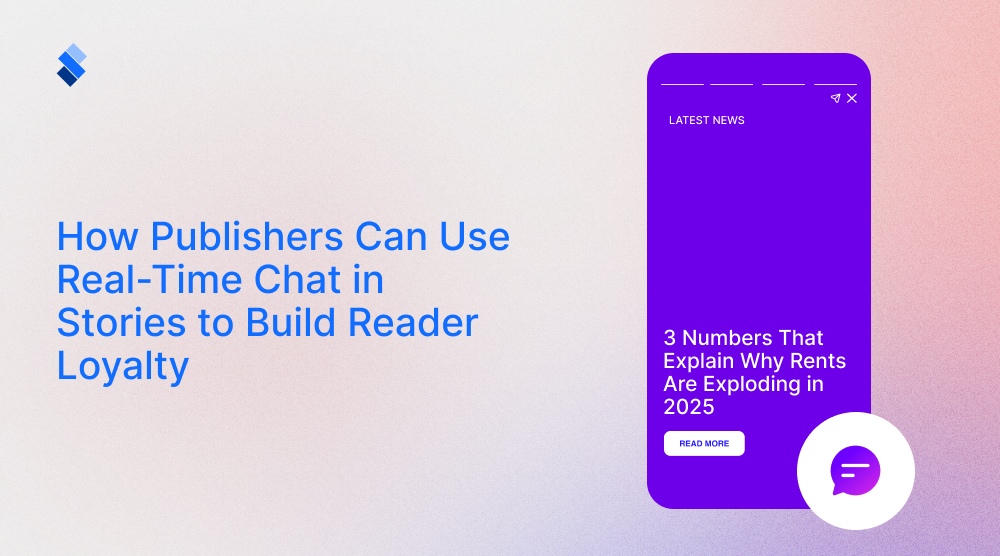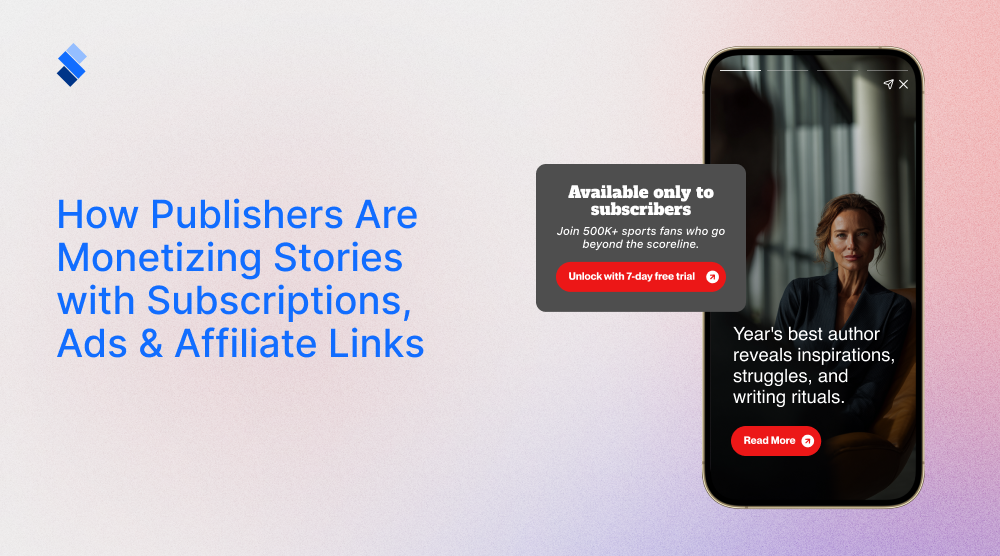Ethics in Web Storytelling: Publisher's Responsibility
An important subject that people often overlook is the ethical considerations in web storytelling. Well, let's take a closer look at it.

Almost all publishers mainly focus on content creation and marketing. And while tackling these two is necessary if a publisher wants to succeed, it is also important to look at the broader picture. There are numerous factors that determine whether a publisher will be good, not only content quality and marketing reach. One such factor is the trust that the publisher is able to build with their online audience. And that trust can only be built if the publisher realizes the importance of their work and what will happen if they don't do it right. So, for this article, we will take a step back and consider the ethical considerations in web storytelling.
Ethical considerations in web storytelling
Being a publisher is by no means a modern job. Even if we look at it from a modern perspective, we can still safely say that the job of a publisher has been around for more than two centuries. During those two centuries, we've recognized what ethical standards publishers need to follow, and what happens when they don't.
Now, the digital landscape presents unique challenges and opportunities when it comes to telling stories online. And while it carries over certain ethical values from non-digital media, modern publishers do have to face new ones. So, let's explore what responsible publishers have to consider in the 21st century.
Accuracy and truthfulness
The first and foremost ethical norm in web storytelling is ensuring accuracy and truthfulness. Doing so as a publishes is crucial because it underpins your credibility and trustworthiness. If your content is accurate and true, it empowers readers to make informed decisions and enables you to fulfill a basic social responsibility. On the other hand, if your content is inaccurate or untrue, it can lead to detrimental effects. Building trust with an audience is hard enough as it is. And if you don't ensure the accuracy of your content, you are bound to lose trust.

Furthermore, fact-checking your content and ensuring that it is truthful can have legal implications. Depending on the type of content, you can be liable for litigation if you provide false or wrong information. Especially if your content is educational. The more technical your content is, the more important it is that you fact-check it as much as possible.
Transparency
If you feel that your content is fair and truthful, there is no reason for you not to be transparent. In our view, publishers should always outline their sources of information and potential conflicts of interest. Readers have the right to know where the information comes from and if there are any biases. That way they can have a clear idea of where your ideas come from, and how you come to certain conclusions.
This really becomes important when you deal with product reviews. Namely, reviewing a product because you decided to do so, and reviewing it because a brand paid you to do so are completely different things. Reputable publishers clearly state that they will remain firm and unbiased, even if brands pay them for reviews. And, if they are truly reputable, they actually do so. Nevertheless, it is still important that those publishers outline that they are paid for the review.
Similarly, if publishers choose to advertise a product, they should clearly label it. Both sponsored content and native advertising need to be clearly segmented in order to avoid deceiving readers. Of course, this will lessen the impact of the marketing. But, we cannot escape the fact that doing so is ethically right.
Privacy
If you plan on mentioning specific individuals in your content, it is important that you respect privacy. Ideally, you will only publish personal information with written consent. Otherwise, you are clearly breaching an ethical code. Depending on the type of content, this also can have legal ramifications. This is why you'd be smart to adhere to relevant privacy laws and regulations, such as GDPR or CCPA when collecting and using user data.

If you plan on gathering user data (say for marketing) it is also necessary to ensure that the data stays safe. Online safety should always be a primary concern of online publishers. Especially when the viewers provide financial data. If you choose to monetize your content through subscriptions, you need to be extra careful. Any data breach will be seen as a failure on your part, and will likely lead to legal actions.
Sensitivity and respect
When addressing certain subjects, it is the ethical duty of publishers to have a degree of sensitivity and respect. Tragedies, accidents, personal stories... All these need to be talked about in a mature, respectful tone. While some publishers choose to be bombastic and controversial in order to garner views, this attention will be short-lived at best. Meanwhile, the negative light brought by the disrespectful tone can have a lasting effect on the people involved. So, always avoid sensationalism or exploitation of human suffering for clicks or views.
User-generated content
We already wrote about how potent user-generated content is and how you, as a publisher, should look to include it. But, before you do so, you really ought to establish guidelines and moderation processes for user-generated content. After all, it is in everyone's interest that you prevent:
- Hate speech
- Harassment
- Spread of false information.
The users who generate content for you should be clear on what you will and won't tolerate. So, encourage civil and respectful discourse within online communities associated with your content. There is an argument to be had that by doing so you are censoring your viewers, as you don't allow them to express themselves fully. But, in our view, this type of censorship is not only beneficial but necessary.
Accessibility
While accessibility is often seen as a marketing issue, we feel that it is also an ethical one. Namely, by not making your content accessible to as many people as possible, you are in fact ostracising certain individuals. Keep in mind that we aren't only talking about making your content accessible on various mobile devices. You also need to take into account people from different regions and impairments (visual or audio). Too often we see publisher limit their content for no apparent reason. And seeing how easy it is to make content accessible with modern tools, we truly feel that doing so is a necessity. Make sure that you provide alternative text for images, and captions for videos, and use accessible web design practices.
Copyright and attribution
This one comes from both a legal and ethical standpoint. Namely, if you plan on posting content, you need to respect intellectual property rights. Properly attribute sources and obtain necessary permissions when using copyrighted material. If you plan on using content that is public domain, make sure that you are aware of fair use and public domain guidelines, as well as international copyright laws. Copyright is a big concern in the modern digital landscape. This is why a single copyright strike can ruin your online reputation.

Community and Feedback
One of the best ways to grow an audience in the modern online space is to foster a community. You do this via social media and regular interactions with your viewers. Now, you can choose not to do so, and simply publish content. But if you do choose to develop a community, there are certain ethical obligations to consider.
Firstly, it is important that you foster an open dialogue with your audience. Encourage feedback, address concerns, and be responsive to user comments and inquiries. Doing so is not only beneficial for brand development but also for helping your audience learn. You should also take action against hate speech, harassment, or misinformation within your online community. It is your duty not only to represent your brand but also to control how your audience talks within the space you provide.
AI content
One of the biggest ethical considerations in web storytelling is the use of AI content. On the one hand, AI is a potent tool for publishers. And it is only going to become more powerful as time goes by. Not only does it make creating written content easier, but it has also left a mark on visual content. Even now we have various AI tools that streamline the creation of visual content and provide astonishing results in a minuscule amount of time.
On the other hand, AI is making it harder for content creators to find entry-level jobs. All high-end content creators, be they writers, digital artists, or voice artists, had to start somewhere. And that start has effectively been taken away by AI. As time goes on, AI may even take over the jobs of high-end artists, and push them out of work. Furthermore, the more we use AI content, the more it will look the same. While we find it novel now, it won't be long before we start recognizing AI content from the get-go. But, before that happens, it is quite possible that AI content creation tools will make human content creators obsolete.

In our view, publishers need to leave room for content creators to develop. Yes, this essentially means that you need to do something that isn't cost-effective. And even while writing this we can imagine some of you wrincing in disgust. But, alas, we are discussing ethics. And ethics and profit rarely go hand in hand. We often see content as marketing products, which blinds us to the artistic aspect of it. And it is up to publishers to recognize the importance of expertise within content, and how important it is to protect that from the influence of AI.
Final thoughts
It is important that we recognize that publishers play a vital role in shaping online content. As such, they must uphold high ethical considerations in web storytelling like trust, integrity, and safety. Adhering to these ethical considerations can help publishers not only help create meaningful, responsible, and valuable content in the digital age but also help plant the seeds for further content development.







